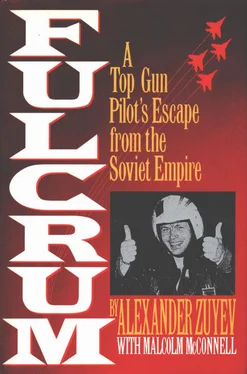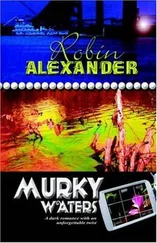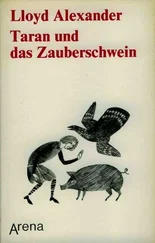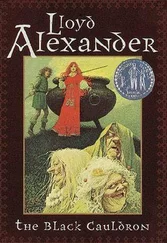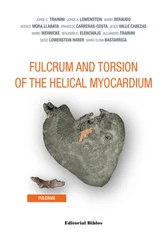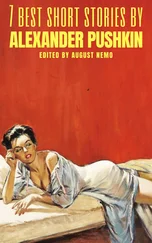Alexander Zuyev
with Malcolm McConnell
FULCRUM
A Top Gun Pilot’s Escape from the Soviet Empire
I am pleased to acknowledge with gratitude the many people who have supported me in this project. This book would not have been possible without the help, friendship, and support of the following people:
Larry Bond, Sergei Sikorsky, Steve Collins, Bill Reesman, Wayne Handley, Vice Admiral Richard M. Dunleavy, Bill Ghana, Don Duncan, Mike Warren, Chuck Brady, John Hansen, Dwight Murray, David North, Sandy Sanders, Barbara Woodbury, David Maybury, Pat Moneymaker, Ken Waiters, Brant James, and all the others who assisted me.
My special thanks and appreciation goes to:
Victor Belenko, for surviving his own escape flight, and for giving me advice (even when I didn’t want it!).
Tom Clancy, for all his insight and know-how.
Robert Gottlieb and Mel Parker, for taking a chance.
Malcolm McConnell, for his patience and understanding, even though he didn’t speak Russian.
Tom Boyd, for teaching me invaluable aviation terms like “sheet hot.”
Tim, Harry, Ken, and Jan, for their trust and support working with me.
And, most of all, I am grateful to my mother and brother for their love and support.
Several of my friends and former colleagues described in this book are patriotic officers currently serving in the armed forces of the Commonwealth of Independent States. In order not to jeopardize their careers, I have disguised some of their actual identities.
Measurements of weight, distance, and altitude have been converted from metric units to the British/American system. Airspeed is expressed in knots.
PROLOGUE
Mikha Tskhakaya “Ruslan” Air Base,
20 May 1989, 0520 hours
I pulled the Makarov pistol from the left breast pocket of my leather flight jacket, cocked the action, but did not set the safety as I normally did. There was now a 9mm round in the chamber and seven more in the magazine. The serrated plastic grip felt comfortably familiar. Almost every day of my seven years as a pilot in Frontal Aviation regiments, I had handled the weapon. And I had carefully cleaned it only the day before. I knew I could trust the small automatic to shoot straight, but hoped I would not need to fire it. Slipping the gun into my right front jacket pocket, I strode through the cool dawn toward the duty-alert apron. As I walked, I checked the maintenance buildings and the line of the squadron ready rooms to the left. There was no one in sight.
I had to hurry. The rising sun was already above the snowy wall of the Caucasus to the east. Ahead, the familiar outline of a soldier wearing a black quilted jacket and floppy southern field hat, an AKM assault rifle slung on his right shoulder, was silhouetted against the flank of the first aircraft. The four MiG-29s in the alert section were parked in two pairs, sharing the two squat generator trucks between their wings. Even trailing engine-start umbilical cables, their canopies, missiles, and instrument probes sheaved in canvas ground covers, the lean, shark-gray aircraft evoked power and speed. Drawing near the planes, I felt the same old excited anticipation that had always gripped me before an important wrestling match. But that emotion was shattered by the bizarre reality of my situation. It was just after dawn on a clear spring morning in the Soviet Socialist Republic of Georgia. In half an hour I would be in Turkey, having escaped from the Soviet Union aboard one of my country’s most advanced fighters.
But now I had to concentrate on the task at hand: disarming and binding Corporal Chomayev, the alert apron guard standing ahead in the shadows. It would have been simpler to slip up behind him and slit his throat with my thick-bladed Gypsy knife. But I had vowed to complete this escape with no bloodshed. I looked back one last time to the duty-alert building 350 yards behind me. It was still possible that someone there might wake up and sound the alarm, despite the elaborate precautions I had taken. Even with the telephone lines cut, they could use the emergency radio in the control tower. And there was certainly enough time for a resourceful officer in regimental headquarters on the far side of the base to order the runway blocked with fuel trucks or maintenance vans, even though I had already disabled the vehicles down here.
But I was a fighter pilot trained for combat. I had carefully considered my decision. The time for doubts had passed. It was too late to hide what I had done. Conceivably I could blame food poisoning for the effects of the drug-laced cake I had fed the men of the alert section and the guardhouse. I had chosen that method to incapacitate them because I did not want any of my friends charged with aiding my escape.
But there would be no way to explain the phone lines I had cut or the armory padlock I had jammed. These were acts of treason. And further undeniable proof of that treason was here in my blue flannel helmet bag that held my handwritten diagrams and specifications of weapons systems and air-combat maneuver tactics. If I were captured before escape, the security investigators of the Osobii Otdel would have ample evidence that my action was a meticulously planned hijacking of an advanced multi-role combat aircraft. Stealing a MiG-29 armed with the newest missiles and electronics and flying it to the West was high treason to the Socialist Motherland.
There was no way back for me. I stepped around the number four plane and onto the apron. Chomayev stood near the nose of the number three aircraft. I knew he would be worried, prepared for a reprimand from the justifiably angry duty-alert officer. Arriving twenty minutes late to his guard post on the apron could cost a soldier a severe reprimand and an extra detail cleaning the latrine.
“Chomayev,” I snarled in my best parade-ground voice, “tell me why you were late.”
The burly Tatar soldier braced his shoulders, but did not come to rigid attention as I had hoped. “Comrade Captain,” he stammered, “it wasn’t my fault. They didn’t wake me up in time.”
We were only three feet apart now, and he still gripped the stock of his Kalashnikov. I could no longer posture. I swung the pistol up and leveled it at Chomayev’s chin.
“Hands up!” I hissed.
For a shocked moment, Chomayev glared at me with flat Asian eyes. Then stunned recognition flashed. He knew why I was here. The guard bellowed hoarsely and lunged at me, seizing my right hand and forcing the pistol away from his face.
It would have been easy to jam the muzzle into the folds of his quilted collar and pull the trigger. But that was murder. No matter how difficult, I intended to complete my escape with a minimum of violence. There had already been too much blood shed in seven decades of Soviet history.
Chomayev dragged my pistol hand down and to the left, and was savagely twisting back my thumb. I heard the bone crack and saw my thumb jutting at a bad angle. So I dropped the pistol before he managed to injure my wrist. All those years on the wrestling teams at school and the Armavir Academy had tuned my reflexes. I was confident that I could quickly knock Chomayev out and bind him. As the gun fell to the concrete apron, I clubbed Chomayev with my left fist, putting all my force into the blows to strike his bent neck. The AKM rifle slung on his right shoulder was swinging clumsily, blocking his attempt to fend off the blows.
He loosened his grip on my arm. I grabbed the front of his jacket with both hands and tried to drag him down so I could kneel on his chest and subdue him. His assault rifle clattered away to the left, and I pinned the weapon with my boot, then kicked it under the nose of the aircraft. Chomayev’s wide-brimmed hat went flying as he struggled against me.
Читать дальше
